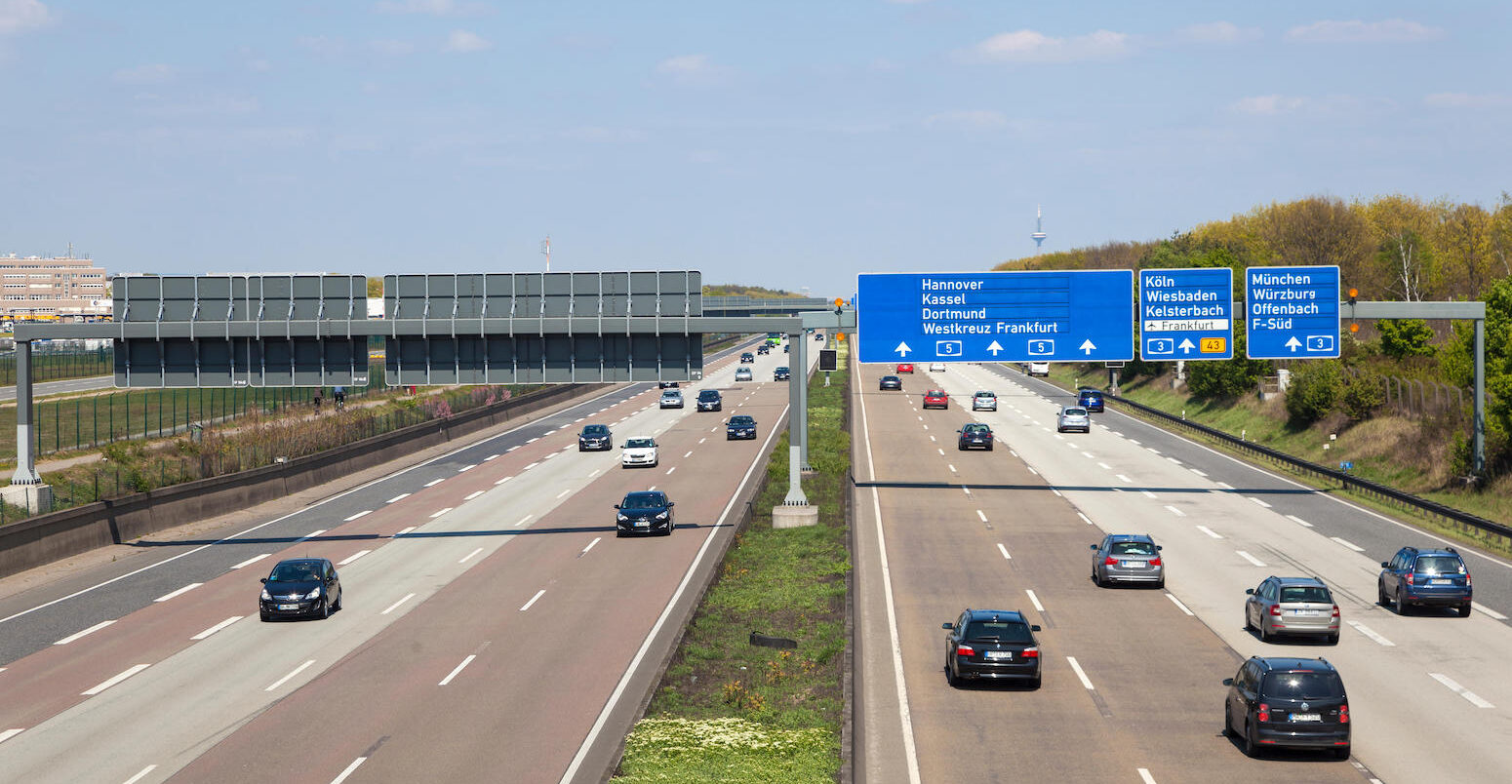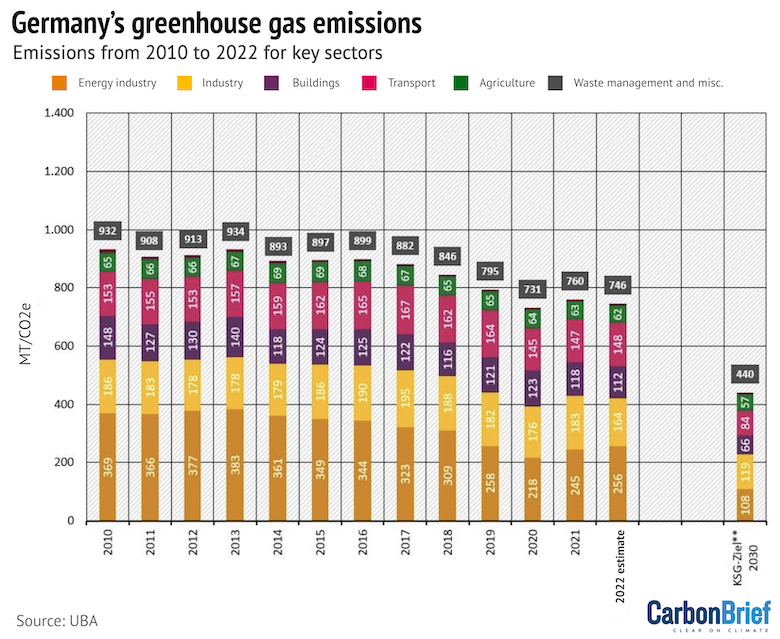
Autobahn speed limit would cut carbon and bring €1bn in benefits, study says
Molly Lempriere
07.25.23Molly Lempriere
25.07.2023 | 4:07pmBringing in a speed limit of 130kph (80mph) across all of Germany’s motorways could result in nearly €1bn in welfare savings, a new study says, with “avoided warming” leading the benefits.
While more than 96% of German roads are subject to a permanent speed limit, just 30% of the 13,000km network of motorways – or autobahn – has permanent or temporary speed limits, according to the German Association of the Automotive Industry (VDA).
Germany is one of the only major countries in the world not to have a nationwide speed limit, a topic which has garnered increasing attention as the country struggles to meet its transport decarbonisation targets.
But, according to a new paper published in the Ecological Economics journal, bringing in a 130kph speed limit on autobahns could bring about nearly €300m in welfare savings from avoided carbon dioxide (CO2) emissions, along with a host of other benefits.
A speed limit enjoys majority public support and there is no “rational argument” against bringing it in, yet the measure is unlikely due to opposition from certain political parties, researchers tell Carbon Brief.
‘Action is urgently needed’
Calls for the introduction of an autobahn speed limit, on the basis of environmental benefits, have been growing since the introduction of the country’s first national climate law in 2019.
This was subsequently updated in 2021 to bring in the country’s current target of being greenhouse gas “neutral” by 2045. This includes preliminary targets for emission cuts of at least 65% by 2030 and 88% by 2040, when compared to 1990 levels.
Additionally, the Climate Action Law of 2021 set annual emission budgets for key sectors, including the energy sector, industry, building, road traffic, agriculture and waste management, as shown in graph below.

For transport, the budget was set at 138.8m tonnes of CO2 equivalent (MtCO2e) for 2022, but this target was missed. Figures from the Federal Environment Agency (UBA) show the sector was responsible for 148MtCO2e last year.
Greenhouse gas emissions from the sector grew by around 0.7% or 1.1MtCO2e from the 2021 figure, making it the only sector to not only miss its target, but also show a year-on-year increase in emissions.
This was despite high fuel prices and the temporary rollout of the €9 public transport ticket, designed to both cushion people from surging fuel costs and incentivise greener forms of transport.
“Germany is currently off-track to meet its sectoral emission targets in the transport sector, which is also the only sector where emissions have remained roughly stable since 1990,” Dr Giulio Mattioli, of the Technical University Dortmund’s urban development research group within the department of spatial planning, who was not involved in the study, tells Carbon Brief. “So action is urgently needed.”
In January, a study from the UBA showed that bringing in a speed limit of 120kph (75mph) on motorways across Germany would cut emissions from passenger cars and light commercial vehicles by 6.7MtCO2e a year.
This followed the UBA in 2020, using a different methodology, finding that an 120kph limit would reduce emissions by 2.6MtCO2e.
“A general speed limit on motorways would make a meaningful contribution to reducing climate change impact,” UBA president Dirk Messner said at the time. Messner added:
“The transport sector, in particular, has done little in terms of climate change mitigation since 1990. We must take advantage of every opportunity in this area, especially when these measures are virtually cost-free and can be realised immediately. A speed limit on motorways not only helps the climate but also reduces noise and pollutant emissions and increases traffic safety.”
However, following on from the most recent research from the UBA, the German transport minister Volker Wissing renewed his rejection of a general speed limit.
“The state should hold back here”, the free-market Free Democrat (FDP) minister said, according to a January report from Tagesschau. It quoted him saying:
“Speed belongs to the citizens’ own responsibility as long as others are not endangered.”
In the same month, Wissing was accused of breaking Germany’s Climate Law, with reports that he had violated the law’s requirements with his unambitious proposal for reducing emissions in the transport sector.
In 2021, the International Energy Agency (IEA) had recommended that all countries have speed limits on motorways, noting that a 100kph (62mph) limit would reduce emissions from road transport by 3% or 140MtCO2 in 2030 globally.
Avoided CO2 benefits
The new analysis finds that bringing in a 130kph speed limit would not only help tackle emissions from road transport, but would also provide an overall welfare gain of €951m, including €293m in avoided CO2 emissions.
It applies a cost-benefit analysis (CBA) onto the potential of a speed limit on German autobahns, looking at the value of travel time, fuel consumption, infrastructure, crashes, CO2 and air pollution. In doing so, it places a value on the welfare gains of such a restriction.
“We decided to look into the speed limit implications, because it has often been said that a speed limit incurs an economic cost of time losses,” explains Prof Stefan Gössling at the School of Business and Economics, Linnaeus University and lead author of the paper.
He tells Carbon Brief that they were able to show that although private costs, such as time losses, and private benefits, such as fuel savings and insurance cost savings, were impacted, the overall effect of a speed limit is positive, offering “a significant benefit for society”.
The team utilised the UBA’s 2020 calculations – as mentioned above – to highlight that bringing in speed limits of 100kph, 120kph and 130kph on the motorways would have avoided 4.3MtCO2e, 2.0MtCO2d and 1.5MtCO2e of emissions, respectively, that year. This is equivalent to 4.9%–14.1% of total emissions from travel on autobahns of 30.4MtCO2e, it states.
This is on the basis of the overall assumption that 206bn vehicle kilometres (vkm) were driven on autobahns in 2020, of which 114bnvkm or 56% fall on sections that do not have a speed limit.
With average emissions of 175g of CO2 per vkm, 1.5MtCO2 would have, therefore, been avoided if a 130kph speed limit was in force across the whole autobahn network.
While it is worth noting that transport volumes had declined significantly in 2020 due to the Covid-19 pandemic, these findings are consistent with other studies. Irrespective of traffic volumes, a speed limit will save 5% of direct emissions as a minimum on a motorway, according to the study. Gössling explains:
“Emissions from German transportation have essentially stayed the same for more than a quarter of a century. There has been almost zero progress on climate goals. Germany will not be able to meet its climate commitments without very significant changes in the transport system. A speed limit should be an uncontroversial measure, bringing down emissions by at least 5%. Notably, the proposed limit at 130kph is still higher than the speed limit in most European countries.”
The paper notes that there are additional system-wide impacts of a speed limit, such as encouraging engines to be optimised for lower speeds, improving the overall fuel economy of vehicles. Engines are often downsized as part of this shift, leading to indirect emission reductions in the supply-chain.
The table below summarises the welfare costs and benefits of a 130kph speed limit on German autobahns. While private costs and benefits – shown in the top four rows of the table – effectively cancel each other out, a range of social benefits mean there is a significant overall welfare gain of €951m, listed in the bottom row.
Cost-benefit assessment of a 130kph speed limit
| Parameter | € /vkm | million € |
|---|---|---|
| Private/business costs | ||
| Time losses (business/private) | 0.0091 | 1052.6 |
| Private/business benefits | ||
| Fuel savings | 0.09 | 765.7 |
| Traffic jams (phantom jams) | 0.0001 | 0.1 |
| Avoided crash costs | 0.0331 | 254.7 |
| Social Benefits | ||
| Emissions of CO2 | 0.0341 | 292.5 |
| Supply chain (infrastructure & energy) | 0.0333 | 284.8 |
| Traffic infrastructure (maintenance & new) | 0.029 | 247.6 |
| Air pollutants (tire wear, exhaust) | 0.0073 | 62.4 |
| Fuel subsidies | 0.0044 | 37.6 |
| Land use and fragmentation | 0.0036 | 30.1 |
| Crash costs (personal & property damage) | 0.0331 | 28.3 |
| Private/business costs | 1052.6 | |
| Private/business benefits | 1020.4 | |
| Social benefits | 983.3 | |
| Private/business and social benefits | 2003.7 | |
| Welfare gain of 130kph speed limit | 951.1 |
The authors highlight that this analysis is based on figures from 2020, when traffic was particularly low due to the Covid-19 pandemic, as noted above.
This means figures from 2021 or 2022 would likely yield significantly larger welfare gains, given that the time spent in traffic jams doubled in 2021 compared to 2020 and fuel costs rose considerably in 2022.
‘Low-hanging fruit’
The analysis builds on the previous calls for the implementation of a speed limit across the full autobahn network, by highlighting the economic impact of such a restriction.
Given the transport sector’s failure to decarbonise in line with targets in particular, many have highlighted both the efficacy and ease of implementing a limit.
For example, the transport and environmental association Verkehrsclub Deutschland (VCD) said a speed limit was “indispensable” in making the sector climate-friendly.
“No other transport measure can contribute more to climate protection. In addition, it can be implemented immediately, and at almost no cost,” the lobby group said earlier this year, following the release of the UBA statistics.
The VCD pointed to the German Federal Climate Protection Act (KSG) figures for emissions reduction, which evaluate the progress made by the road traffic sector to reduce its emissions. The KSG has set out a target of reducing its emissions to 85MtCO2e by 2030 for the sector, down from 164MtCO2e in 1990 and 148MtCOe in 2021.
Bringing in a motorway speed limit would help to reduce the emissions from long-distance trips (those more than 100km). While these account for just 1-2% of trips, they represent 30-50% of transport CO2 emissions, according to Dr Mattioli.
These are not easily tackled by other methods of sustainable transport policy, such as building bike lanes and improving local public transport – measures suggested within the KSG.
Mattioli tells Carbon Brief a speed limit is “low-hanging fruit” when it comes to tackling emissions from road transport and would also bring multiple other benefits. He says:
“A speed limit would deliver a range of other benefits (such as more road safety), as Gössling’s study shows, and it’s a measure that currently exists, is taken for granted and is politically uncontroversial in virtually every country in the world other than Germany. To put it simply, it’s such a ‘low-hanging fruit’ – if the German government can’t even bring itself to do this, I am not sure what it will actually be able to do to reduce transport emissions.”
However, some have criticised the suggestion that a speed limit would have a significant enough impact on emissions to justify its implementation.
“A general speed limit would have very little impact on climate protection,” says the VDA. In a statement on its website it notes:
“According to the latest results from the Federal Environment Agency, a speed limit of 120km per hour would save greenhouse gas emissions equivalent to 6.7MtCO2e annually – that would be almost 0.9% of the total greenhouse gas emissions in Germany. Compared to global CO2 emissions in 2021 (36.3GtCO2), the share would be just under 0.0186%. However, we expressly consider the value of 6.7MtCO2 to be far overestimated.”
No ‘rational argument’
While there is growing evidence pointing to the implementation of a speed limit helping to tackle emissions, it is far from certain that Germany will actually implement the policy.
Gössling tells Carbon Brief that in his view, the FDP is to blame:
“Given that a significant majority of Germans are in favour of a speed limit, including the policies, we unfortunately have a situation where the decision is blocked by a small party [the FDP] for reasons of personal interests or pressure from lobby organisations. There is no rational argument against a speed limit.”
His paper points to recent opinion polls showing that 55-63% of the population as a whole is in favour of a speed limit. Mattioli says:
“Polls have shown for a while that a majority of Germans supports a motorway speed limit although a relatively large and loud minority opposes them.”
Like Gössling, he points the finger at the FDP, but also the opposition CDU, for blocking the implementation of an autobahn speed limit. Mattioli concludes:
“But two right-of-centre parties (CDU and FDP) oppose it and have become even more opposed over time, going as far as to include a rejection of motorway speed limits in their 2021 electoral manifestos. Given the nature of coalition politics in Germany, every government coalition will include at least one of these two parties for the foreseeable future, and they will be able to continue vetoing the measure. So I don’t see that happening anytime soon.”
Stefan Gössling et al. (2023) The economic cost of a 130 kph speed limit in Germany, Ecological Economics, https://doi.org/10.1016/j.ecolecon.2023.107850
-
Autobahn speed limit would cut carbon and bring €1bn in benefits, study says





